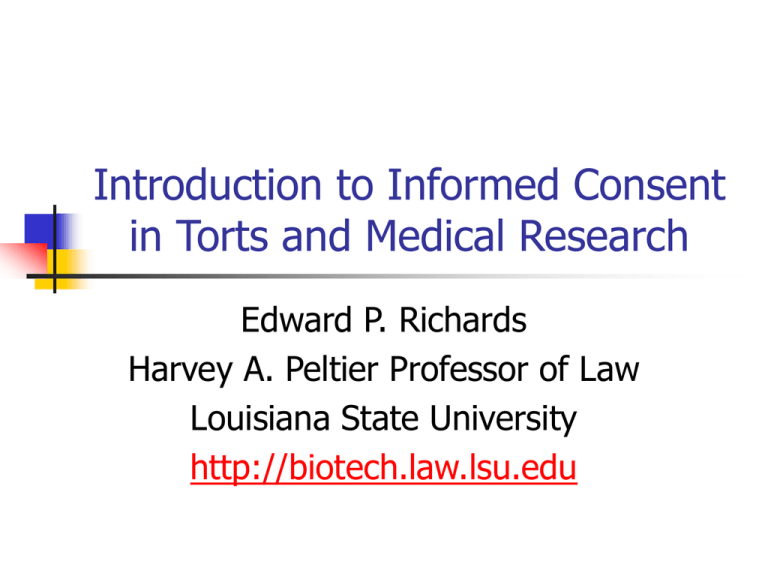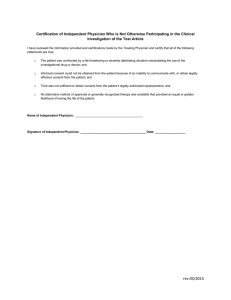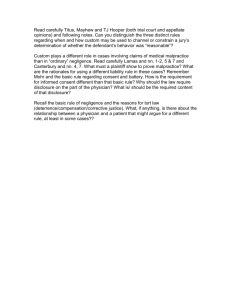Review of Informed Consent - Powerpoint
advertisement

Introduction to Informed Consent in Torts and Medical Research Edward P. Richards Harvey A. Peltier Professor of Law Louisiana State University http://biotech.law.lsu.edu Sources of Law Federal Standards for IRBS State Statutes State Common Law What is the Remedy? Federal Law Federal Government Can Sanction Investigator Federal Government Can Cut off Funds to the Investigator and the Institution No Private Remedy for the Patients/Subjects State Tort Law Battery Negligence – Failure of Informed Consent Battery Every human being of adult years and sound mind has a right to determine what shall be done with his own body; and a surgeon who performs an operation without his patient's consent, commits an assault, for which he is liable in damages. Schloendorff v. Society of New York Hospital, 105 N.E. 92 (N.Y. 1914) Battery Classic Intentional Tort Elements Intent Harmful or Offensive Touching Damages Still Important if No Consent Rejected if there is Consent Generally not Insured When Consent is Not Necessary Emergency Exception Patient Cannot Consent A Reasonable Person would have Consented Cannot Use the Emergency Exception if the Patient Refuses Care Consent by a Guardian or Parent Court Ordered Care Some Public Health Treatments Informed Consent Negligence Elements Duty Breach Causation Damages Duty Person with the Legal Duty to Obtain Consent Usually the Treating Physician Letting the Nurse Get the Forms Signed does not Shift the Duty Cannot Say, “It is the Nurse’ Fault” Hospital Can Assume Duty, but Physician is Still Liable Breach of Duty Standard of Care Must Have Expert Testimony on What Patient Should Have Been Told Reasonable Physician Standard Reasonable Patient Standard LA 1299.40 E(2)(a) In a suit against a physician or other health care provider involving a health care liability or medical malpractice claim which is based on the failure of the physician or other health care provider to disclose or adequately to disclose the risks and hazards involved in the medical care or surgical procedure rendered by the physician or other health care provider, the only theory on which recovery may be obtained is that of negligence in failing to disclose the risks or hazards that could have influenced a reasonable person in making a decision to give or withhold consent. Causation Must show that a reasonable person could have refused the treatment had there been adequate disclosure Hard to do for life-saving or emergency care Easy to do for cosmetic and other elective care Damages Must be damaged by the consented to care No recovery for dignitary injury Doc does not disclose risks, but you do not suffer the risk No recovery if you suffered a disclosed risk, even if there were lots of undisclosed risks LA Cases Lugenbuhl v. Dowling, 701 So.2d 447 (La. 1997) Fortier v. Dehne, 804 So.2d 819 (La.App. 4 Cir. 2901) Baham v. Medical Center of Louisiana at New Orleans, 792 So.2d 85 (La.App. 4 Cir. 2001),



